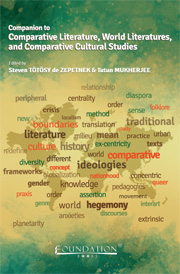Book contents
- Frontmatter
- Contents
- Introduction to the Companion to Comparative Literature, World Literatures, and Comparative Cultural Studies
- PART 1 Theories of Comparative Literature, World Literatures, and Comparative Cultural Studies
- The Contextual Study of Literature and Culture, Globalization, and Digital Humanities
- Comparative Literature and Ex-centricity
- Possibilities and Limits of Comparative Literature Today
- Comparative Cultural Studies and Pedagogy
- Teaching World Literatures
- Comparative Literature and the History of Literature
- Meltzl de Lomnitz, Comparative Literature, and Philosophy
- Comparative Cultural Studies and Cultural Anthropology
- Comparative Literature and Interart Studies
- Gender and Genre in Comparative Literature and (Comparative) Cultural Studies
- Comparative Cultural Studies and Translation Studies
- Comparative Cultural Studies and the Study of Medieval Literature
- Comparative Cultural Studies and Linguistic Hybridities in Literature
- Comparison and Postcoloniality
- (Inter)mediality and the Study of Literature
- PART 2 Comparative Literature in World Languages
- PART 3 Examples of New Work in Comparative Literature, World Literatures, and Comparative Cultural Studies
- PART 4 Multilingual Bibliography of Books in Comparative Literature, World Literatures, and Comparative Cultural Studies
- Index
(Inter)mediality and the Study of Literature
from PART 1 - Theories of Comparative Literature, World Literatures, and Comparative Cultural Studies
Published online by Cambridge University Press: 05 April 2014
- Frontmatter
- Contents
- Introduction to the Companion to Comparative Literature, World Literatures, and Comparative Cultural Studies
- PART 1 Theories of Comparative Literature, World Literatures, and Comparative Cultural Studies
- The Contextual Study of Literature and Culture, Globalization, and Digital Humanities
- Comparative Literature and Ex-centricity
- Possibilities and Limits of Comparative Literature Today
- Comparative Cultural Studies and Pedagogy
- Teaching World Literatures
- Comparative Literature and the History of Literature
- Meltzl de Lomnitz, Comparative Literature, and Philosophy
- Comparative Cultural Studies and Cultural Anthropology
- Comparative Literature and Interart Studies
- Gender and Genre in Comparative Literature and (Comparative) Cultural Studies
- Comparative Cultural Studies and Translation Studies
- Comparative Cultural Studies and the Study of Medieval Literature
- Comparative Cultural Studies and Linguistic Hybridities in Literature
- Comparison and Postcoloniality
- (Inter)mediality and the Study of Literature
- PART 2 Comparative Literature in World Languages
- PART 3 Examples of New Work in Comparative Literature, World Literatures, and Comparative Cultural Studies
- PART 4 Multilingual Bibliography of Books in Comparative Literature, World Literatures, and Comparative Cultural Studies
- Index
Summary
Abstract: In his article “(Inter)mediality and the Study of Literature” Werner Wolf elaborates on the “intermedial turn” and asks whether this turn ought to be welcomed. Wolf begins with a discussion about the definitions of “medium” and “intermediality” and the impact these concepts and practices exert on scholarly, as well as student competence. He argues that despite of the fact that literary studies ought not simply turn into media or cultural studies, mediality and intermediality have become relevant issues for both teaching and the study of literature especially in the fields of comparative literature and (comparative) cultural studies. Following his postulate of the relevance of mediality and intermediality in the study of literature, Wolf explores ways of integrating the said concepts and practices into the study of literature and, in particular, their integration in the field of narratology. In this context, Wolf presents a typology of intermedial forms.
Introduction
For some time the humanities and the study of literature in particular have witnessed yet another “turn”: the intermedial turn. The integration of the key concepts of this turn — mediality and intermediality — into the study of literature raises at least three issues: 1) problems of the definition of these concepts; 2) the problem of competence with reference to non-literary media; and 3) the question as to whether the concept would overburden literary studies to the detriment of what many still view as the core matter, namely the study of written literary texts.
- Type
- Chapter
- Information
- Companion to Comparative Literature, World Literatures, and Comparative Cultural Studies , pp. 205 - 216Publisher: Foundation BooksPrint publication year: 2014
- 1
- Cited by

